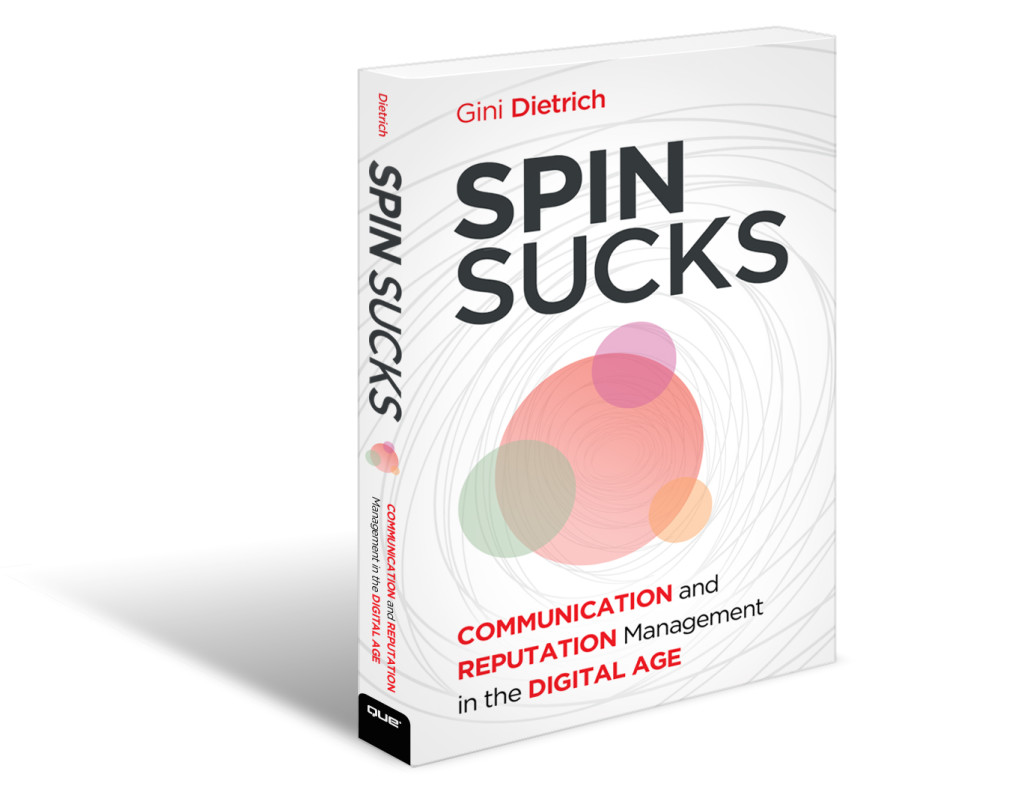What is the role of Public Relations (PR) in the digital and social age? Should we merely hustle for media coverage while producing corporate annual reports?
Well, the answers to these questions may surprise you. At least according to Gini Dietrich (above), author of the book and website Spin Sucks.
While media relations remains an anchor for the PR professional, Dietrich suggests that the digital components of the communications mix will take on greater prominence. These include content, email marketing, social media, crisis and reputation management, events, social advertising, and more. As a long time PR professional turned content and social media marketer, I couldn’t agree more.
Let us dive more deeply into some of the key lessons from the book.
#1 PR Professionals as Brand Storytellers
Unlike PR professionals of the past, digital age publicists must tell their corporate brand story without spin. Stalwarts here include Zappos and their story of delivering happiness, Virgin and their larger-than-life founder Richard Branson, and Red Bull’s unforgettable dive from space featuring Felix Baumgartner.
Here, you can use the formula of fiction writing to tell your story:
- Turn your story from idea to concept. An example of an idea is “The rise of healthy fruit-based drinks” while a concept would be “How Company ABC reinvented the concept of breakfast drinks in 1955 by introducing the smoothie”. Notice how the concept opens the door to a more dramatic question.
- Develop company characters. There are five key elements here: passion (what your audience care about), a protagonist (usually you, your brand or your customer), the antagonist (the villain or “problem” solved by your brand), the revelation (twists in the plot), and the transformation (how things changed thereafter).
#2 Creating Shareable and Searchable Content
To be a blockbuster on screens large and small, your content needs to be valuable, searchable and shareable.
Do the SEO dance with Google
When creating content, consider how your target audience would search for content online.
Be mindful of the following:
- Avoid creating wholesale duplicate content as Google may penalise your search rankings.
- Use the right URLs, keywords, title tags, meta-tags, and alt-texts (for images), to optimise your content. (More about SEO here)
- Stay away from content farms and robots, and black hat practices like keyword stuffing or submission to online directories with low credibility.
- Look out for content scrapers and content stealers, and determine if its worth your while to take action against them.
- Understanding how the different updates to Google’s algorithm affects search engine rankings.
Provide valuable content
The best forms of content – be they blog posts, articles, web copy, ebooks, white papers, newsletters, videos, images, or case studies – are those which provide value. They are trustworthy, written by experts, free of typos/spelling/grammar mistakes, reflect original thinking, and helpful to customers and prospects.
By regularly sharing such content, your website will rise in authority on the specific topic and be rewarded by Google with higher site rankings.
#3 Paid, Earned, Shared, and Owned Media
This brings us to the question of media. According to Dietrich, you can make use of the four different forms of media. They are as follows:
- Paid Media. For PR, paid media in this case refers to social media advertising, sponsored content (see native advertising), and email marketing.
- Earned Media. Traditionally known as publicity or media relations, it includes newspaper or magazine write ups, broadcast news coverage, and coverage by online news portals.
- Shared Media. Also known as social media, this space includes channels like Facebook, twitter, LinkedIn, Instagram and YouTube. Community management is important here.
- Owned Media. Otherwise known as content, these are the brand stories, articles, and user content that you create on your website or blog.
Have a look at how these four circles intersect in the infographic below (courtesy of Spin Sucks).
#4 Whisper Campaigns, Trolls and Attackers
Unfortunately, digital PR life isn’t always a bed of roses. There are various unsavoury characters and things going on.
The first are called whisper campaigns. Usually initiated by a specific party but disguised as a grassroots communication campaign, whisper campaigns are a form of astroturfing. The trick here is to avoid doing these at all costs as the truth will eventually be discovered.
(See my article on Influencer Marketing Ethics to learn more about ethical online behaviours.)
Trolls and attackers can also wreck havoc on your online properties, and they need to be managed. The best way to stop trolls is to establish clear policies on communication on your platforms, actively police it by deleting inappropriate comments, and block people who persistently flout them.
As a general rule to managing online criticism, Dietrich suggests these seven steps:
- Create an internal policy for managing criticism online. Ensure all team members are on the same page.
- Be cautious and try to take it offline as soon as possible.
- Assume the best. Don’t be defensive but seek to be helpful and pleasant.
- Consider the nature of the medium.
- Do not delete posts. Doing so may remove the damage temporarily, but could be worst when the truth emerges later.
- Use common sense. Think like a human being and demonstrate empathy.
- Have a written external policy.
#5 Media Relations in the Digital Age
Citing that PR is “a marathon, not a sprint”, Dietrich suggests that you should follow the following steps if you do not wish to hire a PR professional:
- Read blogs, publications and online sites; watch programmes; listen to shows where you wish to appear
- Personalise your pitch to each media
- Comment on their blog posts and articles
- Do not send a long email
- Relinquish control to the journalist
- Use social networks to connect with media persons
- Read the articles written by specific journalists
- Send something in the mail. This could surprise and delight your journalist.
- Volunteer to speak about industry trends if you are knowlegeable about them
Personally, I found some of these ideas pretty useful and would try to apply them if I can.
#6 Engage Customer Brand Communities
The best form of digital PR strategy is to build and empower a strong community of online supporters. By doing so, you can harness the collective influence of your brand community to leap to your defense should push come to shove.
Begin by paying attention to what people are saying online, participate in the conversation, and allow your community to help you with customer service, new product development or market research. Finally, be honest, open, active, consistent, creative and proud of who you are online.
#7 Managing Online Crises
Citing various case studies like Applebee’s, Penn State, Tiger Woods and Domino’s Pizza, Dietrich suggested that you should manage issues such that they do not turn into full-fledged crises.
Once again, Spin Sucks provides invaluable tips for the strategic, thoughtful and targeted management of issues to prevent them from erupting:
- Act Swiftly. The faster we can nip the issue in the bud, the sooner it will fade.
- Address the Problem. Do not hide or fudge the issue.
- Communicate the Story. Wrestle control of the issue by telling your side of the story. Silence is not golden as keeping mum allows the other side to make up things.
- Communicate Where it Happens. Use the platform where the issue emerges to quell the flames, be it YouTube, Facebook, blogs or Twitter.
- Hire a Communications Expert. Yes, I do have some experience in managing online crises, and you can drop me an email if you wish. Make sure that your expert is on speed dial.
- Think before you Act. Don’t let your emotions crowd out your logical and reasoning mind.
- Empower your team. With adequate media training, your staff can help you control the issue.
- Say I’m sorry. Do it genuinely. No “buts”!
- Back down when you’re wrong. Yes, don’t be afraid to admit your mistakes and to change your online activities to match what you say.
An Essential Guide for Digital Age Publicists
As we have recently seen with the Nikon Photo Contest PR Fiasco, the speed at which online issues explode into crises is blinding. Without a good knowledge of the digital and social media, PR professionals often scramble while trying to manage their organisation’s reputation, spread goodwill, or parry off online attackers.
With Spin Sucks, we now have an invaluable guide to accompany us through both our darkest and brightest days. Covering the key issues faced by communication practitioners, it helps us to navigate the choppy waters of the digital and social age.




Quite insightful ! How can I get a copy of the book?